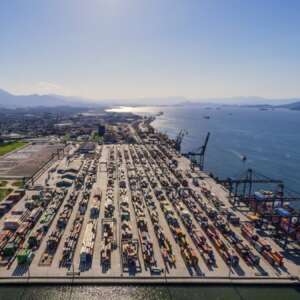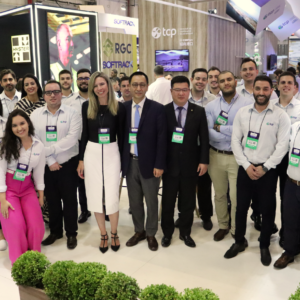TCP GO also allows drivers to consult schedules, documents and notices: all directly from cellphones; the objetive is to reduce the usage of paper to access the terminal.
TCP, the company that manages the Paranaguá Container Terminal, officially launches on Thursday (23) the mobile application TCP GO, which aims to streamline the scheduling for the entry of truck drivers in the terminal, eliminating the need for printed forms. With a daily average of 1,300 trucks received at the terminal, the technology will optimize processes both for users and for the company itself.
During the launch week, a team will be mobilized at terminal’pre-gate, to help drivers with installation and registration in the app. The orientation is to have an active registration of the driver, done by the carrier, in the customer portal. Once this is done, the trucker must download the app and validate his driver’s license and registration data. To complete the access, he just needs to register his e-mail and cell phone number.
For more information about the app, access the user manual here.
With TCP GO, the driver can open a digital entry form, generating a QR Code that will be used to access the terminal. The app also allows users to access their visit history, receive real-time notifications about the terminal and road situation, and will also allow the trucker to rate his experience at the terminal.
“Our goal is to make life easier for drivers, reducing the time they spend at the terminal, reducing traffic jams and eliminating paper consumption,” adds TCP’s I.T. manager, Walter Maria Júnior.
Developed over a year by TCP’s I.T. team, the app will initially be available for cellphones with the Android operating system, and can be downloaded from the Google Play Store or through the link. The launch at Apple Store will happen soon. If in doubt, the driver can contact TCP’s call center: (41) 2152-5999.
Investments in new technologies
TCP GO is part of the Paranaguá Container Terminal’s plan for innovation in technology. In 2022, for example, TCP became the first port in Brazil licensed to use a private wireless network LTE (Long Term Evolution). The technology ensures more reliability in the operation, providing benefits to customers with more security, less risk of damage, and improved cargo handling.
LTE technology was implemented in addition to the Wi-Fi network for greater operational availability. It is the same used in the operators’ cellular networks, offering high speed, low latency, and the mobility required for the Terminal’s operation. “The LTE project is part of the high availability architecture plan of the infrastructure to meet the large volume of movements that the terminal performs, currently exceeding 1.1 million TEUs, characterizing TCP as a large-scale international terminal. Our goal is to make the company offer the best and most technological container system in the industry,” says Walter.



